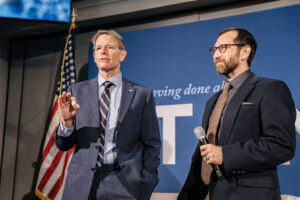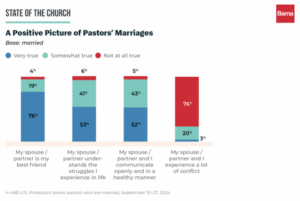
NASHVILLE, Tenn. (BP)–Even though political campaign ads on television have yet to outnumber the ads for prescription drugs, the 2008 presidential race sometimes seems to be in full swing.
The past has shown us that now is the time for citizens who are concerned about the direction the country is heading to communicate their value-driven convictions to those who would like to occupy the White House.
As illustrated by their shifting positions, politicians are not immovable objects; they can be enlightened. And one of the greatest opportunities to impact a politician is while he or she is still a candidate. They are especially open to perspectives other than their own during the primary campaign season, when viewpoints are still being formed and positions staked out. Some have been known to switch positions completely.
In a piece he wrote for the Weekly Standard (Feb. 26, 2007), Fred Barnes observes that when politicians switch positions they “usually stay switched.” He notes that when Ronald Reagan and George H.W. Bush became pro-life, they stayed pro-life in their presidencies. And when Bill Clinton and Al Gore moved into the pro-choice camp, they stayed there.
These candidates did not change their positions by chance. They were convinced to do so by outside influences. We have heard this year that one of the candidates switched his position on embryonic stem cell research when he heard a callous statement by a scientist on the fate of human embryos in the lab.
Americans who hold to biblical values have every right to be making their presence and preferences known to those who are in the race for the highest office in the land.
Now is the time to get ahead of the spin. Perhaps more than at any other time in our nation’s history, the candidates running for president appear to be willing to listen to and consider opposing viewpoints — in hopes of getting an edge on their competitors in what appears to be the most wide-open race for the White House in nearly a century.
EARLY BIRDS ARE GETTING EARLIER
Presidential campaigns, perhaps by necessity, kick into high gear — thus insulating the anointed candidates from the populace — earlier than any other run for public office. In the past two presidential elections, the major party candidates have been decided before the cherry trees around the capital’s tidal basin burst into bloom.
In 2000, after a cold start in New Hampshire — John McCain won a resounding victory there — George W. Bush’s campaign began to pick up steam, posting wins in California, Ohio, Missouri, Georgia and Maryland. While McCain captured several other contests in New England states, his campaign was out of steam by early March and Bush coasted into his party’s nominating convention in August.
For all practical purposes, John Kerry had sewn up his party’s nomination in March 2004, with John Edwards taking the perennial bridesmaid role and Howard Dean undone by his primal screech. On the GOP side, the incumbent George W. Bush was a shoo-in.
With many candidates and no clear leaders, the 2008 election season may be different, offering a few more weeks before each side’s winner is declared. Yet several key states have moved their primaries earlier in the year.
While it is debatable whether any of these early bird primaries and caucuses will determine the two major parties’ nominees, they will establish some clear winners and losers.
Iowa still leads the nation in the presidential sweepstakes with its caucuses being held on Jan. 14 — about 10 months away. Democrats will caucus in Nevada on Jan. 19. The first-in-the-nation primary is traditionally in New Hampshire — so far no other state has leapfrogged the Granite State — and is slated for Jan. 22, followed by South Carolina on January 29.
Then the floodgates open with Alabama, Arizona, Arkansas, California, Delaware, Missouri, New Mexico, North Dakota, Oklahoma and Utah scheduled to hold primaries on Feb. 5. Michigan and Pennsylvania are considering a move to that date, which would effectively constitute a national primary day.
Many more states will have held their primary by the second week of March.
MAKE A DIFFERENCE NOW
While some may worry it is too early in the process to get involved, there is no time like the present to voice your opinion. Before you know it, it will be time for you to go to the polls and vote your values, beliefs and convictions.
Why wait to make a decision based on choices made by others? Why not get involved and try to change the candidates’ perspectives now? Both parties can use more help than all the people of faith in America can give them.
By interacting with the candidates now, you can influence the decision-making process much earlier, and you may well find that it will lessen the chance that you will be asking yourself on Election Day, “Why am I being forced once again to choose between the lesser of two evils?” or “Why don’t I have a better choice?”
–30–
Richard Land is president of the Southern Baptist Ethics & Religious Liberty Commission.














